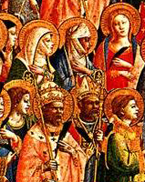 Holy Orders
Holy Orders
Holy Orders (Ordination) is that sacrament by which we mark those chosen to serve God as ministers among his people. We recognize three distinct orders of ministry: Deacon (from diakonia - service), Presbyter (from presbytros or elder - a priest who serves as helper/consulter to the bishop) and Bishop who serves as the shepherd of his flock.
The apostles left in their stead persons who came to be called bishops (overseers). After prayer and the laying on of hands these early leaders would continue the Apostolic tradition. They would help select and then ordain their successors. Our tradition can be traced hand on head through the Syrian Orthodox Church back to Saint Peter in Antioch.
The order of deacons developed to assist the bishops in their material care of the Church. They helped the poor and the needy among the Christian community and served also as ears for the bishop. The seven mentioned in the Book of Acts became spiritual models for the deacons in their service to the Church. St. Stephen, the first Martyr, was one of the first deacons.
The order of presbyter (elder) was at first sort of a council of elders which helped the bishop. When the Church grew beyond the cities into the countryside, these elders were sent out as extensions of the local bishop. It was a natural development that these presbyters would also represent the more distant communities of Christians to their bishop in the life of the Church. Eventually we came to call these ministers priests. Priests serve under the authority of a bishop and in that bishop's name. (The Orthodox often use the phrase "under the omophor or omophorion" which is the bishop's stole.)
Deacons, priests and bishops are not super Christians. They are servants of believers who themselves are servants of God's reign. The calling is from God. It is mediated and affirmed by the community of believers with its bishop. Because in baptism we are all members of Christ's Body with a fundamental equality (neither male nor female, neither Greek nor Jew.) OCCA recognizes that both men and women are called to ordained ministry. Some of our clergy are vowed in celibacy, others are single and open to a covenant relationship, and others already have spouses. OCCA always seeks the permission of the spouse before a candidate's ordination.




